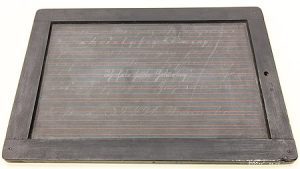
Thursday Mar 07, 2024
Does God Forget?
I want to forget some things. But does God forget? Does God choose not to remember and if so, how does this help me heal?
I once visited the ancient ruins of Olympia, Greece.
The tour guide told me that in the entrance to the athletic stadium there were once pillars and inscribed on them were the names of people who had cheated in their events.
Not only that, but alongside the athletes’ name was the name of the town they came from.
It was a simple message of shame and guilt for all the world to see. The athlete and the town now had a reputation.
What would it be like to have your crimes and sin etched in stone for all the world to see?
Who would be your friend when everything about you was exposed and known?
Maybe only someone who has experienced the same level of humiliation and exposure.
I forget
I would like to forget some events in my life. Things that people have done to me and also things I have done to others.
I seem to be able to forget my shopping list, where I put my keys, and what I had for dinner last week. But it’s harder, much harder, to forget what seems to have been etched into my heart.
Those etchings have seemingly formed and shaped my life from an early age.
The bumps and bruises have pushed me this way and that.
Talk to anyone at a deep level and before long, we discover how early life events have forged deep and long-lasting conclusions.
It takes time to rewire some of those early childhood conclusions. Over the top, generous, grace-filled time.
But all of those events, good and bad, must be stored up in some cosmically vast data bank somewhere. Matter doesn’t just simply disappear.
I wonder if God forgets any of it.
Does God forget?
I don’t believe God forgets anything.
That might frighten you because you’ve had experiences where people have dragged up past events to use as some sort of evidence against you. Instead, you would much rather those events to be forgotten and done away with.
But what if God recorded everything? The good, bad, joys, struggles, triumphs and the simply plain boring stuff of life.
All recorded without any judgment of right or wrong. It’s simply there as a recorded event.
Oh, yes, and it’s not just your stuff, it’s everyone else’s too!
You can see the entire story of everything – AND I MEAN EVERYTHING.
But we, in our humanness, have a bias towards the negative. We have a velcro tenacity to hold on to the bad and be teflon slippery to the good.
The brain is like Velcro for negative experiences, but Teflon for positive ones. [This] shades “implicit memory”–your underlying expectations, beliefs, action strategies, and mood–in an increasingly negative direction. Rick Hanson.
I would suggest that many of us, deep down, think God has a similar mindset bias. That God holds on to our list of sins and is ready to throw it all back in our faces, whilst negating any good.
This progresses on to the view of God that God is ‘checking a list to see who’s been naughty or nice cause Santa God is coming to town.’
Wipe the slate clean
One of the earliest writing tools we had as humans was slate.
In 18th- and 19th-century schools, slate was extensively used for blackboards and individual writing slates, for which slate or chalk pencils were used (wiki).
From this use of slate, we have the phrase ‘To wipe the slate clean’ which means to wipe away all the old stuff and to start anew.
In fact, here in New Zealand, we have the clean slate scheme as part of our legal system.
God has an even better scheme.
God says this.
I am He who wipes the slate clean and erases your wrongdoing.
I will not call to mind your sins anymore. Isaiah 43:25
Other versions of the Bible put it differently.
“I—yes, I alone—will blot out your sins for my own sake
and will never think of them again.” Isaiah 43:25
I, I am He
who blots out your transgressions for my own sake,
and I will not remember your sins. Isaiah 43:25
God chooses to not drag up the past and to hold it against you.
God is capable of regurgitating all the muck and mess of your life, but because God is love and has a reputation of love to ‘kept up’ as such, chooses not to remember.
A ‘choosing to not remember’, is vastly different from a ‘forgetting’, which is a very human thing to do.
Holding on or handing over?
Why do we keep holding on to hurts? Why do we find it so hard to forgive ourselves and others?
I think these hurts can become like little thorns digging into the psyche. Poking, prodding, and causing us pain.
These little thorns grow into giant splinters, digging into every area of our life.
We compensate by avoiding certain topics or people because we know that will set the whole firewood pile ablaze and burn up everything and everyone around us.
But we hold on to it because someone has to pay.
We can’t let them go because we believe someone has to pay. It’s a debt and debts have to be paid.
We are the bookkeeper and everything is recorded for future reference in a court of law where we are judge, jury, and executioner.
Handing over of the pain and the memory to God is a risky business because you never quite know what God might do with it.
God may well not do what you want or think God should do (think of the story of Jonah).
It’s a process too. The brain wants to keep us going back to the old and familiar. But with grace filled prayer, it slowly changes and lets its grip slip away.
God holds all, knows all, and is full of justice, mercy, and grace.
Can you hand over those memories into safe and all knowing hands?
God forgives and chooses not to remember.
Can we do the same?
Can we give over to God a memory that haunts and holds us tight?
To say ‘I will never forgive …’ is to say ‘I will never be free.’
What’s takes more energy to maintain? A clenched fist or an open palm?
Can we trust God to clean us from things that hold us back?
If we say that we have no sin, we are only fooling ourselves and refusing to accept the truth.
But if we confess our sins to him, he can be depended on to forgive us and to cleanse us from every wrong. And it is perfectly proper for God to do this for us because Christ died to wash away our sins. 1 John 1:8-9
Questions?
Comments?
Email me 🙂📨
barry@turningthepage.co.nz
Quotes to consider
- Acceptance is not our mode nearly as much as aggression, resistance, fight, or flight. None of them achieve the deep and lasting results of true acceptance and peaceful surrender. Richard Rohr.
- Justice–is getting what is deserved
Mercy–is not getting what is deserved
Grace–is getting what is not deserved
Darrell Johnson - Forgiveness involves a willingness to release an offending party from all requirement to experience the just consequences of his or her wrongdoing. Advice to forget an offense in the sense in which God “forgets” our sin does not address the problem of feeling angry when the memory of the offense recurs. It goes no further than the counsel to decide to forgive and to choose to minister. The problem of bitter feelings remains untouched. Larry Crabb The Marriage Builder: A Blueprint for Couples and Counselors
- Counsel to forget an offense fails to advance our understanding of forgiveness, and it is also discouraging. If taken literally, such counsel insists that either we damage the memory storage area of our brains or we introduce selective amnesia through the process of pathological repression. Of course, no one is recommending these absurd remedies. Larry Crabb The Marriage Builder
- The key to “forgetting” an offending event is a reevaluation of the event until it is seen as not especially important to one’s purposes. Bitterness will give way to disappointment (which is acceptable) if the firm decision to forgive is accompanied by Spirit-led meditation on the truth that needs are fully met in Christ.
Larry Crabb The Marriage Builder - Sin is not a distance, it is a turning of our gaze in the wrong direction. Simone Weil
Questions to answer
- What have you learned from this post?
- ‘Does God forget’? is a challenging question to how we view ourselves and how we have fashioned a view of what God is like. How has your view of what God is like changed over time?
- What would it be like to have a ‘clean slate’? What would it take to offer others a clean slate?
Formation exercise
- Take one of the quotes above and journal a response to it.
Barry Pearman

Comments (0)
To leave or reply to comments, please download free Podbean or
No Comments
To leave or reply to comments,
please download free Podbean App.